Jillian Keiley, Artistic Fraud of Newfoundland founder-National Arts Centre English Theatre artistic director (2012–2022)
“If I could make Canadians understand how important and how good their culture is, I could die happy.”

Photo: Trish Lindstrom
INTRODUCTION
There are many players in this story, but for now, we focus on our protagonist. She stands centre stage, commanding our attention even though she is self-effacing and always quick to share credit. Because she is also bold, creative, playful, enthusiastic, risk-taking, compassionate and wise. A character you cannot ignore.
This woman was born into “busy.” The fourth of five children in a Catholic household in Goulds, Newfoundland, she doesn’t shy away from a loaded schedule. On any given year, she bounces between St. John’s, Newfoundland (where she works as resident director at Artistic Fraud of Newfoundland), Stratford, Ontario (where she frequently directs, and feasts on play after play as a devoted audience member) and Ottawa, Ontario (where she has served as the National Arts Centre’s artistic director of English Theatre since 2012).
In our opening scene, we find her in St. John’s, rehearsing Between Breaths, the new play she’s directing for Artistic Fraud, which will open this August 3. She recently returned from the Stratford Festival, where she launched a production of As You Like It, on until October 22, 2016. Her mind is whirling from the ideas that constantly sprout from and around her; a pillar in the courtyard, players flock to her, entwining to grow new and unusual creations, an abundance of production. But she is also at peace, at home on The Rock, reunited with her music producer husband, Don Ellis, and their four-year-old daughter, Josie.
This is Jillian Keiley.

At the Verona Arena Amphitheatre
ACT I: All the world’s a stage
You don’t have to spend long with Jillian (Jill) to sense that all her world truly is a stage, but in the best possible way. There’s no artifice—she’s as straight and forceful a shooter as they come. For her, the world is a platform from which to exclaim, demonstrate and create.
It’s also a fun, lively place with plenty to admire. Blooming gardens or Christmas lights aren’t just buds and bulbs; they’re set pieces laid out by everyday designers. She constantly sees opportunities to create and isn’t afraid to grasp them, or forge them herself. This is the woman who produced the 24-Hour Mystery Musical, an annual event in St. John’s that challenges people to put together and perform an entire musical production in exactly one day.
When Jill first discovered the theatre, she thought she wanted to become an actor. Her brilliant debut was as baby Jillsus in the local Christmas pageant, a role that required her to captivate the audience without uttering a single sound. (No small feat for a bubbly baby!)
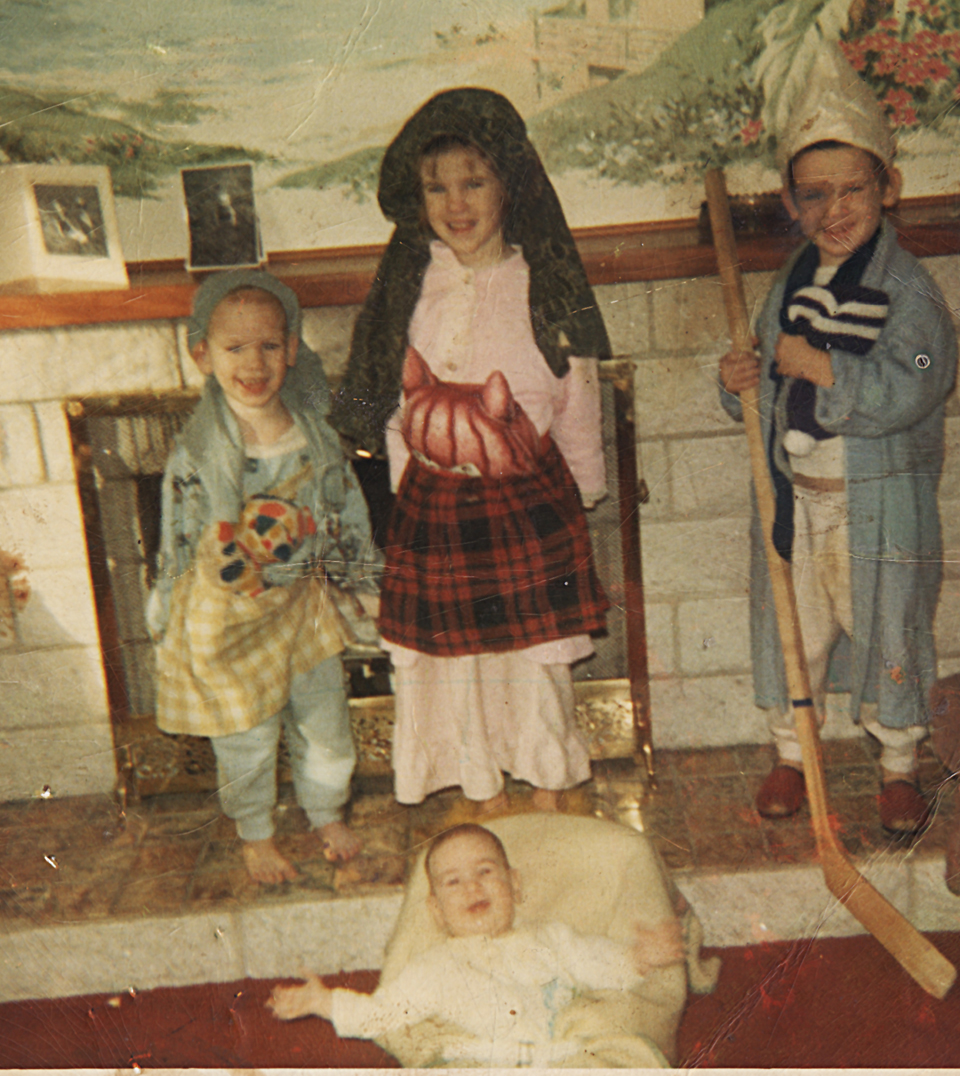
As baby Jillsus, Goulds, N.L., December 1970
But after a few school productions, she soon discovered where she was meant to make her mark. “Being onstage was always less interesting to me than being offstage—watching what was going on and figuring out what the problems were and fixing things or making things better,” she says. “I was never able to really stand inside the play; I always wanted to be outside of it.”
Jill was also far too driven to let others call the shots. When she saw that many of her fellow St. Kevin’s High School students didn’t get around to reading the mandatory Grade 11 play The Still Hearth (which she appeared in for the school production opposite a striking Grade 12 lead actor named Alan Doyle), she decided to direct the show herself to widen its appeal. Fresh out of high school in 1988, she made that play her first as producer.
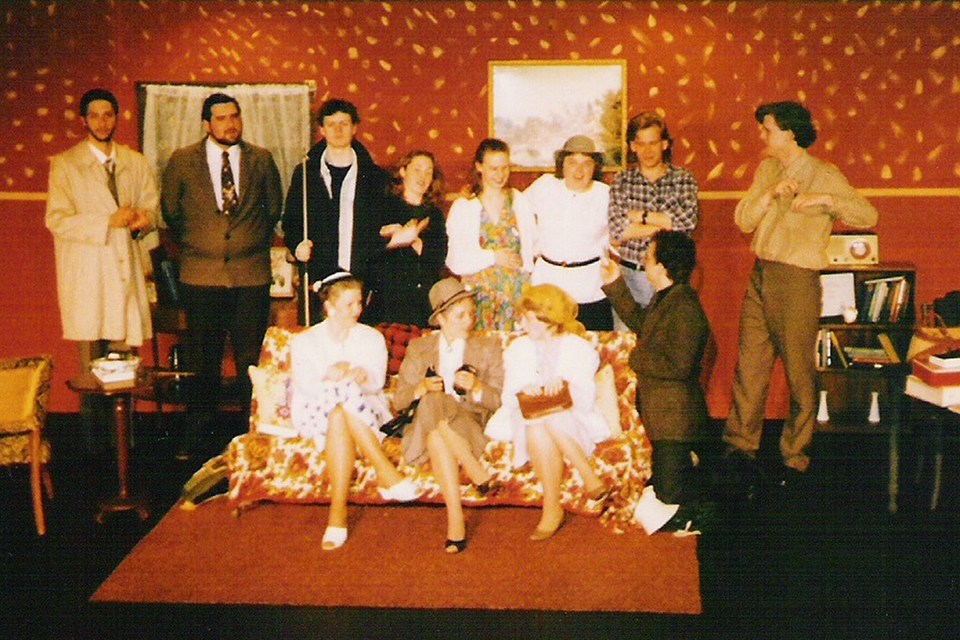
The cast of Jill’s production of “The Still Hearth”
Among the show’s many collaborators was future Great Big Sea musician Bob Hallett, who provided musical accompaniment with his fiddle. Nearly 30 years later, he’s working with Jill again, most recently as musical director for As You Like It. “It’s funny,” she says, “there you are doing this little tiny play in a 70-seat theatre in St. John’s, and the next you thing you know, you’re working together in Stratford.”
Jill has always made a point of surrounding herself with good, talented people. After all, “you’re only as good as your collaborators.”
During her second year studying theatre at Memorial University, Jill took another opportunity to mesh her talents with several wonderful Canadians. Tight on money, she accepted a spot in “a morality play” touring Newfoundland high schools. “I figured it would be an experience worth having,” she says. “And that I could always go back to school.” (In fact, she received an Honorary Doctorate from Memorial in 2009.) Joining Jill on that tour were comedian and television personality Andrew Younghusband, and actor and musician Jody Richardson, among others.
When Jill returned to undergraduate education, at York University for its BFA in theatre, she again took to collaborating, this time with her good friend Chris Tolley. They wrote the musical In Your Dreams, Freud through notes passed back and forth during class, and staged the 45-character piece “in our spare time.”
That production proved to be the perfect complement to Jill’s formal training in directing; it offered valuable, lasting lessons about the real world of theatre. “It’s okay to learn how to direct and know the art of it,” she says. “But unless you know how to get something to actually happen, those skills can get wasted pretty fast.”
In Your Dreams, Freud wound up being the flagship production of Artistic Fraud of Newfoundland, which Jill founded in 1995, the year after completing her BFA at York. (She also received an Honorary Doctorate of Letters from the school this June 2016). The play was hugely popular on The Rock, where it was remounted four times, and she managed to raise enough money to take the production to the Atlantic Fringe Festival.
In Your Dreams was the first of many directorial successes for Jill, including the widely lauded Tempting Providence. Written by Robert Chafe and produced by Theatre Newfoundland Labrador, the play brought Jill national recognition. It became her National Arts Centre (NAC) directorial debut in 2003, and helped earn her the coveted Siminovitch Prize for directing in 2004.
“Right from the beginning of her career, Jill has always been a rabble-rouser—doing everything in her power to create pure, honest and thought provoking work, all the while breaking down boundaries, destroying the mundane and swinging for the fence. She was one of the first professional directors I ever worked with and was instrumental in me deciding to make a go of an acting career. At that time, I thought, ‘If Jill is like this, I can only imagine all directors will have the same ability to take risks and clarity of vision.’ Boy, was I wrong. Jillian Keiley’s vision as an artistic director and director is as unique as it is undeniable. Very few people have ever experienced Jill’s work and not have been struck by her clarity of vision.” —Allan Hawco, Kickass Canadian, actor, co-artistic director at The Company Theatre
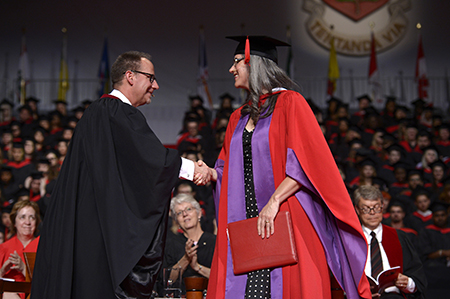
Shawn Brixey, Dean of York’s School of the Arts, Media, Performance & Design, congratulates Jill on her Honorary Doctorate of Letters, Toronto, Ont., June 2016
ACT II: The wise woman knows herself to be a fool
Jill is widely known for her laser-like focus as a director. But she finds that somewhat amusing. “People think I have great clarity of vision; in fact, I just think, ‘I wonder how that would work…’”
For instance, she once reflected on how people sound birdlike when they talk. “You know, the music of that,” she says, before humming a brief demonstration in the cadence of dialogue. “The rhythm and the tone of it—isn’t that music? And couldn’t we substitute music for it? And aren’t voice and music the same thing?”
So, she decided to see how that would work. In Artistic Fraud’s 2001 production of Chekhov’s The Seagull, Jill replaced the famed text with musical instruments that tonally imitated the actors’ interpretation of their lines, before the notes eventually drowned out the dialogue altogether.
For her 2015 production of Twelfth Night at the NAC, she and the Old Trout Puppet Workshop reinvented Shakespeare through puppetry and a highly imaginative, self-reflexive exploration of the classic play.
Back in 1997, Jill and Artistic Fraud staged a production of Under Wraps, starring Allan Hawco, that the Canada Council for the Arts had declared unmountable. Says Allan, “Not only did the Canada Council reps sit in the front row on our opening night, but Jill decided to promote the play with big block letters on the poster. ‘COME SEE THE SHOW THE CANADA COUNCIL SAID COULD NEVER BE DONE!’”
Where do these ideas come from, not to mention this fearlessness of straying from the mainstream?
“Idiocy, pure idiocy,” says Jill. (See? Self-effacing.) “Just having no idea how hard things are going to be.” Yet when she realizes the challenge ahead, she doesn’t back away. Sounds more like bravery than idiocy.
Curiosity also plays a big part. She is first and foremost a theatre lover, always thinking from the audience’s point of view. In 1997, when she thought she’d like to see a production of Julius Caesar that cast the very best actors for each role—regardless of race or gender—she wound up directing a female Caesar in the Artistic Fraud / Dick’s Kids co-production.
One critic applauded her “brave feminist statement.” Even though she hadn’t planned to make any statement at all.
“I didn’t touch the feminism aspect of it,” says Jill. “Julius Caesar just was a woman. But it turned out to be a feminist statement because that’s how somebody else interpreted it… I always believe that every interpretation of a show is completely subjective. Every show is going to mean something different to each person; there are resonances that some people will get, resonances that other people won’t. All theatre is deeply personal, and a unique experience for everyone who sees it.”
“Jill is awesome. She always has been. Her shows, just like her, often make something amazing out of the simplest things. You walk away from them thinking everything is special. How cool is that?” —Alan Doyle, Kickass Canadian, musician, author

Photo: Trish Lindstrom
ACT III: When I think, I must speak
When Jill accepted the position of artistic director for NAC’s English Theatre, she made it clear she didn’t want to focus on premieres.
“I wanted to invest in companies across the country that are doing premieres, who are better outfitted to do premieres than we are,” she says. “I really believe in Canada as a seed-bearing nation. I don’t think work has to be centralized to be good. The most successful project I ever did, [Tempting Providence], was based out of Cow Head, Newfoundland, population 475. I don’t believe you have to be in Toronto or Ottawa to be doing good work.”
So she launched NAC’s The Collaborations, a program that allocates English Theatre resources to shows across Canada, helping them “rise to a greater height.” Run by Jill’s associate artistic director Sarah Garton Stanley, The Collaborations bolsters existing Canadian productions, supporting a wider range of artists while improving the odds of having their work mounted at the NAC. “We’re helping invest in the shows that come to our stages,” says Jill.
She’s also determined to bring more productions to “underserved communities” throughout Canada that “don’t get to see a lot of shows from elsewhere.” In 2017, the NAC will begin touring its plays, starting with Tartuffe, which will travel to Eastern Canada.
Jill sites the NAC’s relationship with Magnetic North Theatre Festival as another way for the NAC to bring excellent Canadian works to a broader range of Canadian communities. By co-producing with Magnetic North, she says, English Theatre is “investing in shows going to places that are relevant to the (local audiences).”
“The first piece of Jillian K’s that I saw was staged down a mine on Bell Island, Newfoundland. I loved it with the intensity only theatre students can love a play. Since then I’ve seen as much of her work as I can, and always admired her vision and distinct style. In particular I’ve been blown away by Afterimage (in which the actors use the set as a musical instrument) and Oil and Water (in which Canadians do some good in the world).” —Hannah Moscovitch, Kickass Canadian, Siminovitch Prize-nominated playwright
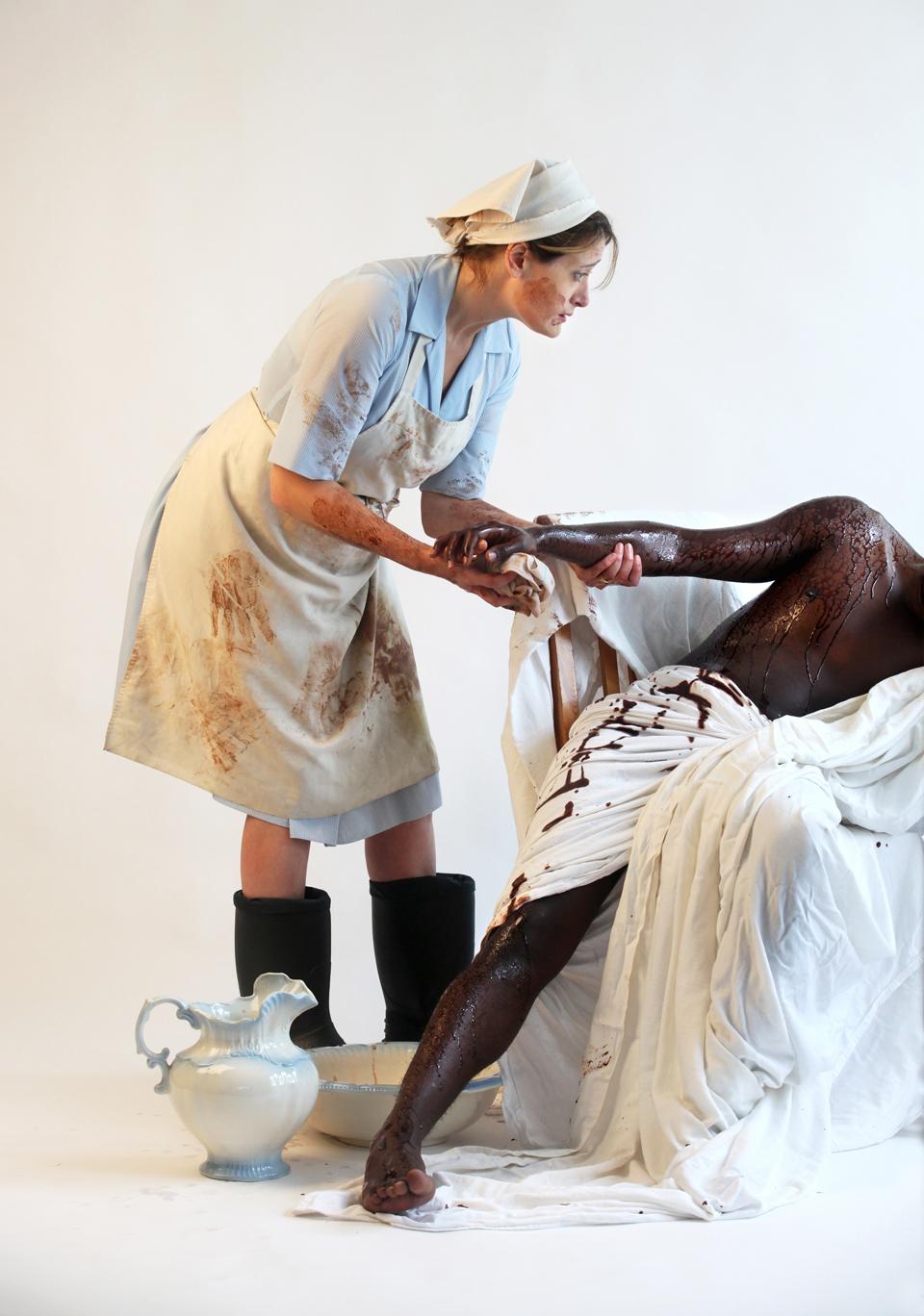
Still from the NAC’s 2014 production of “Oil and Water,” directed by Jill
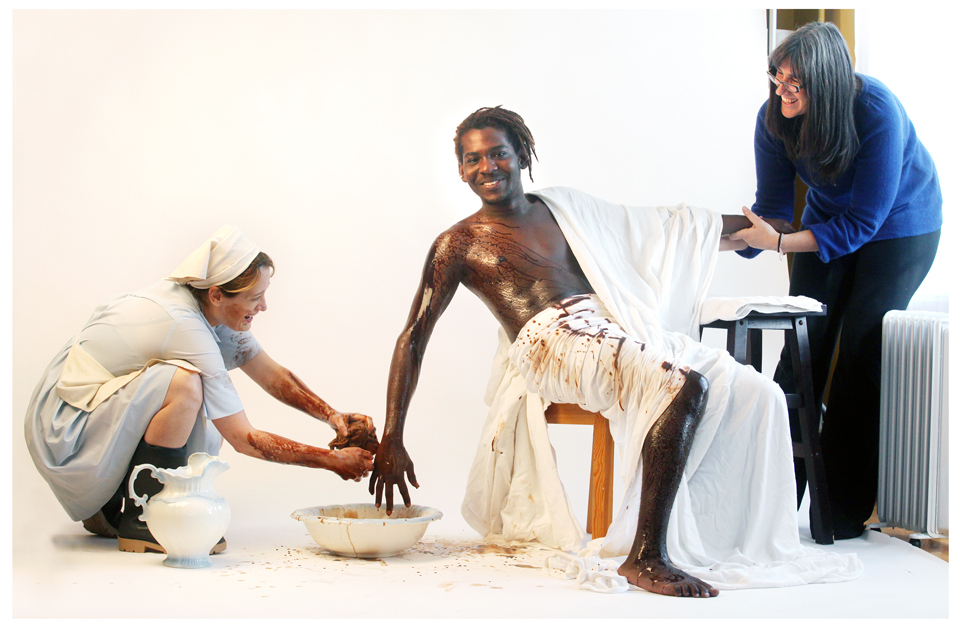
Behind the scenes of the “Oil and Water” photo shoot
ACT IV: This wide and universal theatre
Perhaps most importantly, Jill wants to use theatre “to promote a more compassionate society and a more empathetic society.” Art, as she sees it, isn’t for the elite; it is something by the people, for the people. And as we make more art serving “the diverse backgrounds, tastes and souls” of multigenerational, multicultural audiences, our expression of culture will expand, as will the audiences who enjoy it.
“I still believe in the theatre as a way to illuminate other points of view,” she says. “The reason it’s so important to me that the NAC seasons are so diverse and that there’s so many different kinds of storytellers, it’s not to check a box; it’s so that we get more than one point of view coming out of that stage.
“People’s experiences of this country are very different. If you’re a new immigrant, it can be very different. If you’re a Syrian refugee, if you’re impoverished, if you’re handicapped, it can be very different. Having people who can speak from those different points of view will help us understand our society better and help us understand Canada better.”
No matter the point of view, Jill has one overriding hope for all Canadian theatre, whether it comes from artists who are indigenous, black, queer, female—any of us: that we appreciate it, properly and fully.
“Canadians have a brutal insecurity complex about their own people,” she says. “We truly believe that the best art and the best artists are from Britain and the United States. We can’t identify who we are as a nation and we feel like we’re not quite as good as either of the other countries… But I believe that culture means more to the people who are closest to it.
“If I could make Canadians understand how important and how good their culture is, I could die happy. And the funny and beautiful and interesting thing to me is that it seems to be happening… The fact that the NAC is finally and wonderfully beginning an indigenous theatre stream is so thrilling to me.”
Jill is passionate about a “profound piece of work” coming to English Theatre next year, a musical called Children of God about an Oji-Cree family whose children were taken to a residential school on Northern Ontario. “This is the story of what happened in our very own country, our very own backyard,” she says. “This is conflict ridden, clash of cultures, subjugation of children. These are themes that would inspire Shakespeare, these are themes that would inspire Euripides. And it’s right here; if you want a good story, here’s a good story.”
Her fondest wish is that Canadians look beyond the “marketing machines” of Broadway and London, England’s West End, and embrace the culture that surrounds us—our culture. “There’s so much for us to reflect on and admire in our own country. What if we actually looked to the national stage, what if we looked to the NAC, to see what’s happening in Canada and celebrate that?”
CURTAIN
For the latest on Jill, follow @jillkeiley on Twitter. Visit NAC English Theatre to discover their current and upcoming shows.
Thank you to the NAC’s Sean Fitzpatrick and Judi Pearl for helping make this interview possible.
 Kickass Canadians
Kickass Canadians